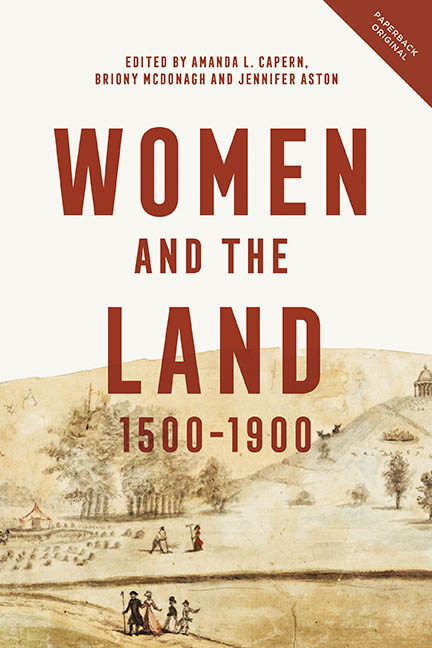Book contents
- Frontmatter
- Contents
- List of Illustrations
- List of Contributors
- Introduction: Women, Property and Land
- 1 Women, Work and Land: The Spatial Dynamics of Gender Relations in Early Modern England 1550–1750
- 2 Spinsters with Land in Early Modern England: Inheritance, Possession and Use
- 3 Becoming Anne Clifford
- 4 The Heiress Reconsidered: Contexts for Understanding the Abduction of Arabella Alleyn
- 5 From Magnificent Houses to Disagreeable Country: Lady Sophia Newdigate's Tour of Southern England and Derbyshire, 1748
- 6 On Being ‘fully and completely mistress of the whole business’: Gender, Land and Estate Accounting in Georgian England
- 7 Negotiating Men: Elizabeth Montagu, ‘Capability’ Brown and the Construction of Pastoral
- 8 Women's Involvement in Property in the North Riding of Yorkshire in the Eighteenth and Nineteenth Centuries
- 9 Invisible Women: Small-scale Landed Proprietors in Nineteenth-century England
- 10 More than Just a Caretaker: Women's Role in the Intergenerational Transfer of Real and Personal Property in Nineteenth-century Urban England, 1840–1900
- Afterword
- Select Bibliography
- Index
- PEOPLE, MARKETS, GOODS: ECONOMIES AND SOCIETIES IN HISTORY
4 - The Heiress Reconsidered: Contexts for Understanding the Abduction of Arabella Alleyn
Published online by Cambridge University Press: 21 March 2020
- Frontmatter
- Contents
- List of Illustrations
- List of Contributors
- Introduction: Women, Property and Land
- 1 Women, Work and Land: The Spatial Dynamics of Gender Relations in Early Modern England 1550–1750
- 2 Spinsters with Land in Early Modern England: Inheritance, Possession and Use
- 3 Becoming Anne Clifford
- 4 The Heiress Reconsidered: Contexts for Understanding the Abduction of Arabella Alleyn
- 5 From Magnificent Houses to Disagreeable Country: Lady Sophia Newdigate's Tour of Southern England and Derbyshire, 1748
- 6 On Being ‘fully and completely mistress of the whole business’: Gender, Land and Estate Accounting in Georgian England
- 7 Negotiating Men: Elizabeth Montagu, ‘Capability’ Brown and the Construction of Pastoral
- 8 Women's Involvement in Property in the North Riding of Yorkshire in the Eighteenth and Nineteenth Centuries
- 9 Invisible Women: Small-scale Landed Proprietors in Nineteenth-century England
- 10 More than Just a Caretaker: Women's Role in the Intergenerational Transfer of Real and Personal Property in Nineteenth-century Urban England, 1840–1900
- Afterword
- Select Bibliography
- Index
- PEOPLE, MARKETS, GOODS: ECONOMIES AND SOCIETIES IN HISTORY
Summary
In early modern English law the legal heirs/heiresses were the beneficiaries of a person's estate either by common-law provision or by device of a will. Through the doctrine of primogeniture the common law defined the heir of the whole estate as the eldest surviving son or a sole surviving daughter. Estates were split between co-heiresses in the case of more than one daughter. This division of landed estate between surviving daughters reinforced cultural association of land with male landownership. The very term ‘heiress’ acquired complex cultural meanings in social commentary and in the rhetorical print world of pamphlets, ballads and plays, which could have negative connotations. This chapter explores those cultural meanings and asks questions about how common it was for heiresses to be abducted by men for their wealth. The bigger question addressed, though, is about how much coercion and violence a woman might consider to be ‘normal’ when gender conflict erupted over inherited property. To throw light on this, the chapter uses a manuscript containing the autobiographical account of Arabella Alleyn (1655–1746). A key argument of the chapter will be that, while it is rare to have a female account of abduction and forced marriage, the abduction itself was not out of the ordinary.
The Alleyn Manuscript and Contexts for Understanding Abduction
Arabella Alleyn's manuscript is virtually unknown. It is not, for example, on the Perdita database of early modern women's manuscript writing. It survives in the papers of the Thompson family, which are embedded within those of the Hotham family of Scorborough and South Dalton in East Yorkshire. Early modern women's autobiography is a rare find and accounts written by abducted heiresses are rarer still. The material form of the manuscript is that of a stitched book. It is roughly quarto-sized, with red, blue, green and yellow marbled covers. If it were a woman's recipe book it would be beautiful. However, the story Alleyn tells is of male predation, abduction of a child, intimidation, psychological manipulation, forced marriage (possibly rape), violence within marriage and familial abuse. Inside the flyleaf Alleyn’s son – William Thompson – has written: ‘those Great troubles did very much indanger her life’. William Thompson knew all about his mother's unhappiness – he was the product of her forced marriage and was named after his grandfather, who had abducted her.
- Type
- Chapter
- Information
- Women and the Land, 1500–1900 , pp. 100 - 126Publisher: Boydell & BrewerPrint publication year: 2019



